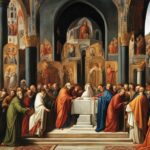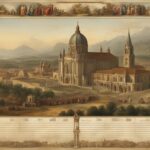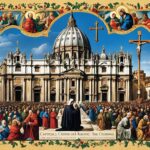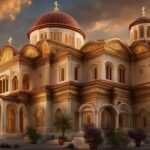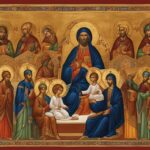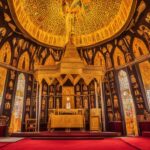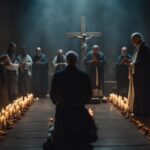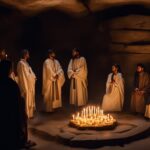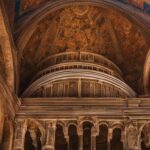The Orthodox Church has a history that dates back to the time of the Apostles, making it one of the oldest Christian communities in the world. It embodies and expresses the rich spiritual treasures of Eastern Christianity, which developed in lands influenced by Semitic and Hellenistic cultures. Today, the Orthodox Church is recognized as the second largest Christian community globally, following the Roman Catholic Church.
Throughout its long history, the Orthodox Church has played a significant role in shaping the course of Christianity and world history. Its origins and founders can be traced back to the early days of the Christian faith, with the teachings of the Apostles and the struggles against paganism and heresy. The Church’s key beliefs and doctrines have been proclaimed at the Seven Ecumenical Councils, emphasizing the Resurrection of Christ and the deification of man.
Key Takeaways:
- The Orthodox Church has a rich history that dates back to the time of the Apostles.
- It developed in lands influenced by Semitic and Hellenistic cultures, shaping its distinct flavor of Christianity.
- The Orthodox Church split from Western Christian traditions during the Great Schism.
- Worship is central to the life of the Orthodox Church, with a strong emphasis on the use of icons.
- The Orthodox Church continues to have a significant influence on various aspects of contemporary society.
Origins and Founders of the Orthodox Church
The Orthodox Church traces its origins back to the time of the Apostles. It was in the eastern regions of the Roman Empire where the Christian faith first matured and struggled against paganism and heresy. The great Fathers of the Church lived and taught in the East, and the fundamentals of Orthodox faith were proclaimed at the Seven Ecumenical Councils.
The Orthodox Church developed in lands that knew the Semitic and Hellenistic cultures, resulting in a distinct flavor of Christianity that emphasized the Resurrection of Christ and the deification of man. The teachings and traditions of the Orthodox Church were passed down from generation to generation, establishing a rich spiritual heritage.
Eastern Christianity played a crucial role in the formation of the Orthodox Church. The early Christian communities in the East were deeply rooted in the teachings of the Apostles, and their faith was shaped by the cultural and philosophical influences of the region. The Eastern Fathers of the Church, such as St. Basil the Great, St. John Chrysostom, and St. Athanasius, played a significant role in the development of Orthodox theology and spirituality.
The Orthodox Church has its roots in the ancient Christian traditions and the teachings of the Apostles. The founding fathers of the Orthodox Church were men of great wisdom and spiritual insight, who dedicated their lives to preserving and proclaiming the Orthodox faith. Their contributions continue to influence the Orthodox Church to this day.
By embracing the teachings and traditions of the early Church, the Orthodox Church remains deeply connected to its origins and founders. It carries on the legacy of the Apostles and the early Christian communities, serving as a spiritual home for millions of believers around the world.
| Key Figures | Contributions |
|---|---|
| St. Peter the Apostle | Considered the first bishop of Rome and the founder of the Christian Church. |
| St. Andrew the Apostle | Preached the Gospel and established the Church in Byzantium, which later became Constantinople. |
| St. James the Apostle | Played a significant role in the early Christian community in Jerusalem and presided over the Council of Jerusalem. |
| St. Paul the Apostle | Known for his missionary journeys and epistles, which played a crucial role in the development of Christian theology. |
Key Beliefs and Doctrines of the Orthodox Church
The Orthodox Church, with its rich history and deep spiritual tradition, holds a set of key beliefs and doctrines that have shaped its identity and practices. These beliefs serve as the foundation of Orthodox Christianity and guide the faithful in their spiritual journey.
1. Maintaining the Apostolic Faith:
The Orthodox Church firmly believes that it has preserved the original teachings of the Apostles without error or distortion. It sees itself as the guardian of the true faith passed down through generations. This belief emphasizes the continuity of Orthodox Christianity and its connection to the early Church.
2. Worship of the Holy Trinity:
The Orthodox Church directs its activities and doctrinal formulations towards the praise and glorification of the Holy Trinity. It recognizes God as three distinct but inseparable persons – the Father, the Son (Jesus Christ), and the Holy Spirit. The Church emphasizes the mystery and divine nature of the Trinity, which is celebrated in its liturgical worship.
3. Emphasis on Theosis:
The Orthodox Church places significant emphasis on theosis, the process of becoming one with God. It teaches that through participation in the sacraments, prayer, repentance, and a life of virtue, believers can experience a restoration of the divine image and likeness they were created in. Theosis is at the heart of Orthodox spirituality and the ultimate goal of every Orthodox Christian.
4. Importance of the Ecumenical Councils:
The Orthodox Church recognizes the significance of the Seven Ecumenical Councils in shaping its beliefs and doctrines. These councils, held between the 4th and 8th centuries, addressed theological controversies and defined essential doctrines, such as the nature of Christ and the nature of the Holy Spirit. The decisions and teachings of these councils remain authoritative in the Orthodox Church today.
| Key Beliefs and Doctrines | Description |
|---|---|
| Preservation of Apostolic Faith | The Orthodox Church believes it has maintained the original teachings of the Apostles without distortion or error, ensuring the continuity of Orthodox Christianity. |
| Worship of the Holy Trinity | The Church directs its worship and doctrinal formulations to the praise and glorification of the Holy Trinity – the Father, Son, and Holy Spirit. |
| Theosis | The process of becoming one with God through participation in the sacraments, prayer, repentance, and a life of virtue. |
| Importance of the Ecumenical Councils | The decisions and teachings of the Seven Ecumenical Councils, which addressed theological controversies and defined essential doctrines, hold significant authority. |
These key beliefs and doctrines form the bedrock of Orthodox Christianity, guiding the spiritual journey of its faithful and shaping its worship, sacraments, and theological understanding.
Historical Significance of the Orthodox Church
The Orthodox Church has a rich historical significance that spans centuries, influencing the course of Christianity and the world. Throughout its existence, the Church has served as a pillar of faith, providing spiritual guidance and support to millions of people. It has played a vital role in shaping the cultural, social, and political developments of the regions where it has been present.
One of the key aspects of the Orthodox Church’s historical significance is its preservation and promotion of ancient Christian traditions. The Church has been a custodian of art, architecture, and liturgical practices that have influenced various spheres of life. From the exquisite beauty of Byzantine architecture to the rich iconography, the Orthodox Church has left a lasting imprint on the cultural landscape.
Furthermore, the Orthodox Church has been a driving force in promoting the teachings of Christianity and contributing to the development of theology. The Ecumenical Councils, which took place between the 4th and 8th centuries, played a crucial role in the formation of Orthodox beliefs and doctrines. These councils not only defined the fundamental tenets of the faith but also addressed important theological controversies.
| Impact of the Orthodox Church | Examples |
|---|---|
| Promotion of Christian Education | The establishment of theological schools and educational institutions has contributed to the spread of knowledge and the preservation of Orthodox teachings. |
| Advancement of Monasticism | Monastic communities have played a significant role in spiritual and cultural development, fostering a tradition of asceticism and contemplation. |
| Championing Social Justice | The Church has consistently advocated for social justice issues, addressing poverty, inequality, and human rights concerns. |
The Orthodox Church’s historical significance lies not only in its spiritual and religious aspects but also in its broader impact on society. Through its cultural contributions, preservation of ancient traditions, and commitment to social justice, the Orthodox Church has left an indelible mark on the world.
Today, the Orthodox Church continues to inspire and influence millions of people worldwide, remaining a powerful force of faith, tradition, and spirituality.
Denominational Split or Schisms within the Orthodox Church
The history of the Orthodox Church has been marked by significant schisms and denominational splits, leading to the formation of different Orthodox denominations with their own distinct traditions and practices. These splits have often been the result of theological, political, and cultural differences among various factions within the Orthodox Church.
One of the most notable schisms in the history of the Orthodox Church is the Great Schism of 1054 AD. This event marked the formal divide between the Eastern Orthodox Church and the Western Christian traditions, which eventually led to the formation of the Roman Catholic Church. The main point of contention was the authority of the Bishop of Rome, also known as the Pope, and the Patriarch of Constantinople.
“The Orthodox Church experienced a major schism in 1054 AD, which led to the division between Eastern Orthodox and Western Christian traditions.”
Since the Great Schism, further divisions have occurred within the Orthodox Church based on regional and cultural factors. Some of the major Orthodox denominations include the Greek Orthodox Church, the Russian Orthodox Church, and the Antiochian Orthodox Church. These denominations have their own hierarchies, liturgical practices, and traditions while still maintaining a common faith and recognition of the Seven Ecumenical Councils.
| Orthodox Denomination | Established | Headquarters |
|---|---|---|
| Greek Orthodox Church | 9th century AD | Athens, Greece |
| Russian Orthodox Church | 10th century AD | Moscow, Russia |
| Antiochian Orthodox Church | 1st century AD | Damascus, Syria |
Despite these denominational splits, the Orthodox Church maintains a sense of unity through its shared faith, worship, and adherence to the Apostolic traditions. The Ecumenical Patriarch of Constantinople, as the “first among equals,” holds a position of honor and plays a significant role in fostering unity among the various Orthodox denominations.
While the schisms in the Orthodox Church have resulted in different denominations, it is important to note that there is a strong desire for unity and reconciliation among Orthodox Christians. Efforts are continually made to address the historical divisions and work towards greater cooperation and communion.
Leadership and Governance in the Orthodox Church
The Orthodox Church is characterized by a unique system of leadership and governance that reflects its rich history and diverse cultural heritage. The Church is composed of a federation of patriarchal, autocephalous, and autonomous churches, each with its own internal organization and customs. While these churches may have different historical, cultural, and linguistic backgrounds, they are united by a common faith and order.
Ecclesiastical Hierarchy
At the head of each Orthodox Church is a leader known as a Patriarch, Archbishop, Metropolitan, or Catholicos. These leaders are responsible for overseeing the activities and spiritual well-being of their respective churches. Their authority is derived from apostolic succession, tracing back to the time of the Apostles. The Ecumenical Patriarch of Constantinople holds a position of honor and is considered “first among equals” in the Orthodox Church.
| Leadership Positions in the Orthodox Church | Description |
|---|---|
| Patriarch | The highest-ranking bishop within a particular region or jurisdiction. |
| Archbishop | A bishop who oversees multiple dioceses within a specific geographic area. |
| Metropolitan | A bishop who governs a specific diocese or metropolitan see. |
| Catholicos | The head of an autocephalous church, often with the title of Catholicos-Patriarch. |
The Orthodox Church is led collectively by synods of bishops, which are responsible for making important decisions and setting policies for the Church as a whole. These synods typically include representatives from different jurisdictions and meet regularly to discuss matters of spiritual, doctrinal, and administrative significance.
“The Orthodox Church is a communion of local churches, each led by a bishop and governed by synodal structures. This decentralized structure allows for a variety of local customs and practices, while maintaining unity in faith and doctrine.” – Metropolitan John of Pergamon
While the leadership and governance structure of the Orthodox Church may differ from other Christian denominations, it reflects the Church’s commitment to maintaining the apostolic tradition and preserving the unity of the faith.
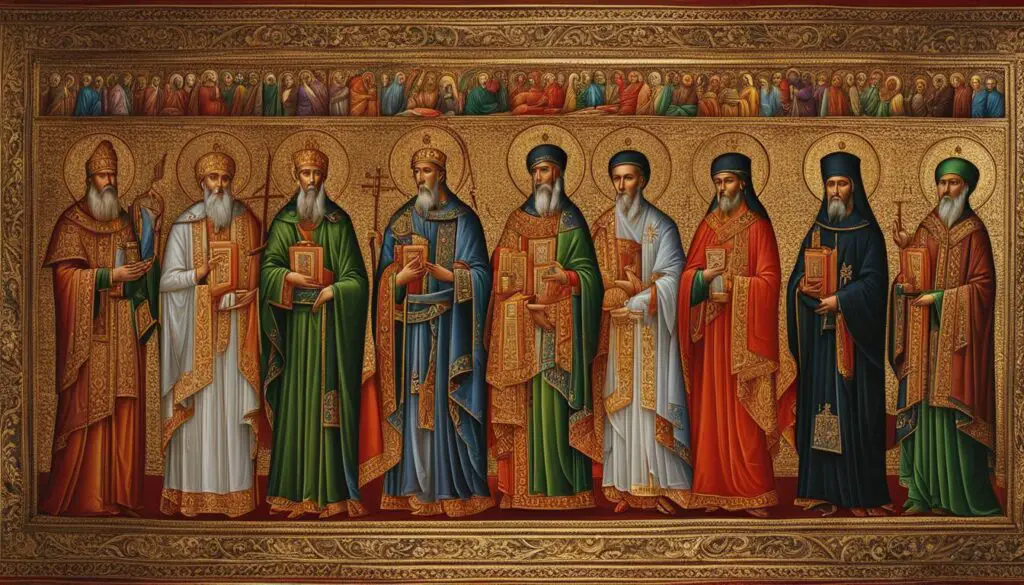
Worship Practices in the Orthodox Church
The Orthodox Church places a strong emphasis on worship, considering it central to the life of its faithful. The liturgy, which is the ritualistic celebration of the Eucharist, holds a prominent position in Orthodox worship. It is during the liturgy that Orthodox Christians believe they partake in the body and blood of Jesus Christ, experiencing a profound communion with Him.
Orthodox worship is characterized by its beauty, reverence, and deep spiritual symbolism. The use of icons, which are considered windows into the heavenly realm, is an essential aspect of Orthodox worship. These images of Christ, the Virgin Mary, and various saints serve as aids for prayer and contemplation, inspiring a sense of awe and connection to the divine.
“The Orthodox Church believes that the use of icons in worship serves to unite the believer with the heavenly reality,” explains Father John, a priest in the Greek Orthodox Church.
The liturgy is a transformative experience, inviting the faithful to encounter the divine presence and participate in the heavenly worship portrayed in the book of Revelation. It is a solemn, yet joyous celebration that engages all the senses and nourishes the soul.
| Sacraments | Description |
|---|---|
| Baptism | The initiation into the Christian faith, symbolizing spiritual rebirth and union with Christ. |
| Chrismation | The sacrament of confirmation, in which the Holy Spirit is imparted upon the newly baptized. |
| Confession | The sacrament of reconciliation, where believers confess their sins to a priest and receive absolution. |
| Marriage | The sacrament that unites a man and a woman in a lifelong commitment, blessed by the Church. |
| Ordination | The sacrament through which men are ordained as deacons, priests, and bishops to serve the Church. |
| Anointing of the Sick | The sacrament of healing, offering comfort and spiritual strength to the sick and the dying. |
Prayer is another essential component of Orthodox worship. Personal and liturgical prayers are considered a means of communing with God and seeking His guidance and intercession. Orthodox Christians engage in various forms of prayer, including the Jesus Prayer, which involves repeating the simple invocation, “Lord Jesus Christ, Son of God, have mercy on me, a sinner.”
The worship practices of the Orthodox Church are rooted in ancient traditions and reflect the deep spirituality of its believers. By engaging in reverent liturgical celebrations, venerating icons, and participating in the sacraments, Orthodox Christians seek to draw closer to God and experience His transforming grace in their lives.
Contemporary Influence of the Orthodox Church
The Orthodox Church continues to have a significant influence on various aspects of contemporary society. It serves as a spiritual and moral authority, providing guidance and support to its members. The Church also plays a role in promoting peace, justice, and social welfare. Orthodox theology and spirituality have also had an impact beyond the Orthodox community, influencing the broader Christian world and engaging in interfaith dialogue with other religious traditions. The Orthodox Church’s cultural contributions, such as art, music, and literature, have enriched the global cultural landscape.
The impact of the Orthodox Church can be seen in its commitment to social justice and charitable work. Through its various institutions, the Church addresses issues such as poverty, healthcare, education, and humanitarian crises. The Church’s teachings on compassion, mercy, and the dignity of every human being inspire its members to actively participate in these efforts, making a positive difference in the lives of individuals and communities.
Furthermore, the Orthodox Church’s influence extends to the political arena. In countries where Orthodox Christianity is prevalent, the Church often plays a significant role in shaping public opinion and policy. Its leaders, known as Patriarchs, Archbishops, and Metropolitans, may engage in dialogue with governmental authorities and advocate for the protection of religious freedom, human rights, and traditional moral values.
Overall, the Orthodox Church’s contemporary influence is multifaceted and far-reaching. It continues to be a source of spiritual guidance, a provider of social support, a promoter of cultural expression, and a voice for justice and compassion in today’s world.
“The Orthodox Church is not just a religious institution; it is a living tradition that has shaped the hearts and minds of countless individuals throughout history. Its influence transcends borders and denominations, offering a unique perspective on faith, spirituality, and human flourishing.”
– Archbishop Thomas of the Greek Orthodox Church
| Areas of Influence | Examples |
|---|---|
| Spiritual Guidance | Providing sacraments, pastoral care, and moral guidance to Orthodox Christians |
| Social Welfare | Running orphanages, hospitals, and charitable organizations to alleviate suffering and promote social justice |
| Interfaith Dialogue | Engaging in conversations with other religious traditions to foster understanding and cooperation |
| Cultural Enrichment | Preserving and promoting traditional art, music, and literature |
| Political Advocacy | Addressing issues of religious freedom, human rights, and social policies |
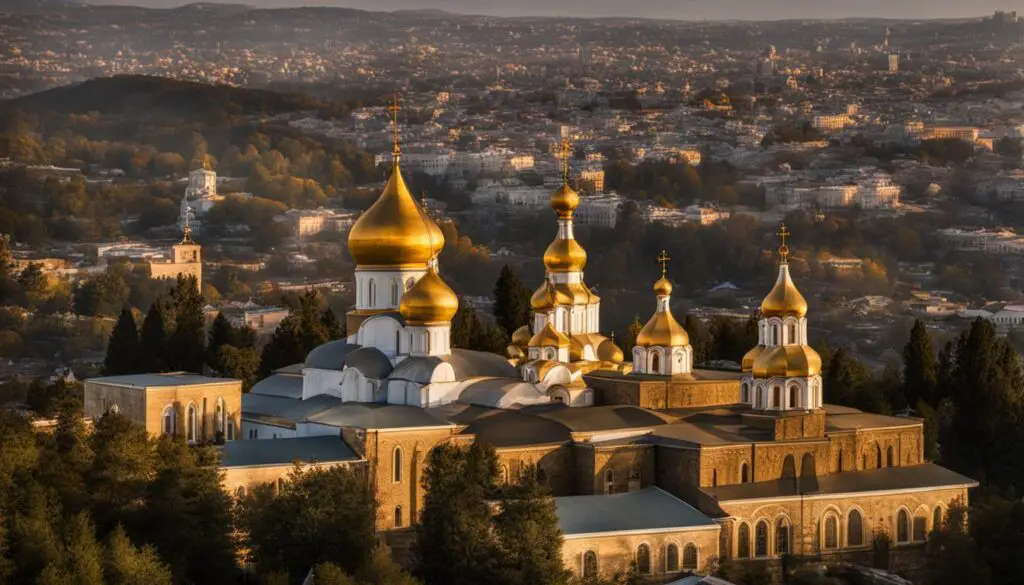
The Orthodox Church’s Impact on Society
One of the key ways the Orthodox Church influences contemporary society is through its commitment to spiritual guidance and moral principles. Orthodox Christianity provides a moral compass for many individuals, helping them navigate the challenges of modern life and make ethical decisions. The Church’s teachings on love, forgiveness, and compassion inspire its members to lead virtuous lives and contribute positively to their communities.
The Orthodox Church also plays a vital role in promoting social welfare. Through its philanthropic efforts, the Church addresses pressing social issues such as poverty, homelessness, and healthcare. Orthodox charitable organizations provide assistance to those in need, offering food, shelter, and medical care to vulnerable populations. This commitment to social justice reflects the Church’s belief in the inherent dignity and worth of every human being.
In addition to its focus on spiritual and social concerns, the Orthodox Church engages in interfaith dialogue, seeking to foster understanding and cooperation among different religious traditions. Through these dialogues, the Church promotes religious tolerance and mutual respect, working towards a more harmonious and inclusive society. By building bridges of understanding, the Orthodox Church contributes to the promotion of peace and cooperation among diverse religious communities.
Current World Membership and Percentage of World Religions
The Orthodox Church is a global Christian community with a significant membership worldwide. While exact numbers can vary due to different sources and regional variations, it is estimated that there are approximately 250 million Orthodox Christians around the world. This places the Orthodox Church as the second largest Christian denomination after the Roman Catholic Church.
To better understand the Orthodox Church’s position in the global religious landscape, it is essential to consider its percentage in relation to world religions. However, determining the exact percentage can be challenging due to factors such as regional concentrations of Orthodox Christians. Nevertheless, it is clear that the Orthodox Church holds a prominent place among the world’s religious traditions.
| Religion | Number of Adherents (Approx.) | Percentage of World Population (Approx.) |
|---|---|---|
| Christianity (All denominations) | Approx. 2.3 billion | Approx. 31.2% |
| Orthodox Christianity | Approx. 250 million | Approx. 3.4% |
| Islam | Approx. 1.9 billion | Approx. 24.9% |
| Hinduism | Approx. 1.2 billion | Approx. 15.9% |
| Buddhism | Approx. 506 million | Approx. 6.7% |
| Judaism | Approx. 14 million | Approx. 0.2% |
While the percentage may seem relatively smaller in comparison to other religious traditions, the Orthodox Church’s rich history, theological depth, and cultural contributions make it a significant presence in the world. Its influence extends beyond its membership numbers, as it continues to inspire and impact millions of individuals worldwide through its teachings, traditions, and spirituality.
Conclusion
The history of the Orthodox Church is a testament to the enduring faith, traditions, and impact of this ancient Christian community. From its origins and founders to its key beliefs and practices, the Orthodox Church has played a vital role in shaping the course of Christianity and world history.
Despite denominational splits and regional variations, the Orthodox Church remains a unified entity, guided by its principles of faith, worship, and spiritual authority. It has weathered the Great Schism of 1054 AD and continues to thrive with various denominations such as the Greek Orthodox Church, the Russian Orthodox Church, and the Antiochian Orthodox Church.
The worship practices in the Orthodox Church are characterized by their beauty, reverence, and deep spiritual symbolism. The liturgy, with the Eucharist as the most important sacrament, holds a central place. Icons, which are considered windows into the heavenly realm, are widely used in worship. Sacraments such as baptism, chrismation, and confession are also integral to the Orthodox Church’s spiritual life.
With its rich history and cultural contributions, the Orthodox Church continues to inspire and influence millions of people worldwide. It remains a significant spiritual and moral authority, promoting peace, justice, and social welfare. Orthodox theology and spirituality have also had an impact beyond the Orthodox community, engaging in interfaith dialogue and enriching the broader Christian world.
FAQ
What is the history of the Orthodox Church?
The Orthodox Church has a history reaching back to the time of the Apostles and embodies the spiritual treasures of Eastern Christianity. It developed in lands that knew the Semitic and Hellenistic cultures, emphasizing the Resurrection of Christ and the deification of man.
What are the key beliefs and doctrines of the Orthodox Church?
The Orthodox Church believes it has maintained and handed down the Christian faith without error or distortion. It affirms the fullness of the Christian faith and emphasizes the process of theosis, becoming one with God. The Church’s activities and doctrinal formulations are directed towards the praise and glorification of the Holy Trinity.
What is the historical significance of the Orthodox Church?
The Orthodox Church has preserved and promoted the teachings of Christianity throughout history, contributing to the cultural, social, and political developments of the regions it serves. It has also been a custodian of ancient Christian traditions, art, and architecture, influencing various spheres of life in the communities it serves.
What is the denominational split or schisms within the Orthodox Church?
The Orthodox Church experienced a major schism, known as the Great Schism, in 1054 AD, which led to the division between Eastern Orthodox and Western Christian traditions. Since then, the Orthodox Church has been further divided into various jurisdictions based on regional and cultural factors.
How is the Orthodox Church governed?
The Orthodox Church is led by synods of bishops, and each church’s leader is known as a Patriarch, Archbishop, Metropolitan, or Catholicos. The Ecumenical Patriarch of Constantinople holds a position of honor and is considered “first among equals” in the Orthodox Church. Each church within the Orthodox Church is independent in its internal organization and follows its own particular customs.
What are the worship practices in the Orthodox Church?
Worship is central to the life of the Orthodox Church, with the liturgy being the focal point. The Church places a strong emphasis on the use of icons, and Orthodox worship is characterized by its beauty, reverence, and deep spiritual symbolism. The Church also practices various sacraments, such as baptism, confession, marriage, and anointing of the sick.
What is the contemporary influence of the Orthodox Church?
The Orthodox Church serves as a spiritual and moral authority, providing guidance and support to its members. It promotes peace, justice, and social welfare. Orthodox theology and spirituality have also had an impact beyond the Orthodox community, influencing the broader Christian world and engaging in interfaith dialogue with other religious traditions.
How many Orthodox Christians are there worldwide?
It is estimated that there are approximately 250 million Orthodox Christians worldwide, making the Orthodox Church the second largest Christian community after the Roman Catholic Church. However, the exact percentage in relation to other world religions may vary depending on geographical factors and regional concentrations of Orthodox Christians.

